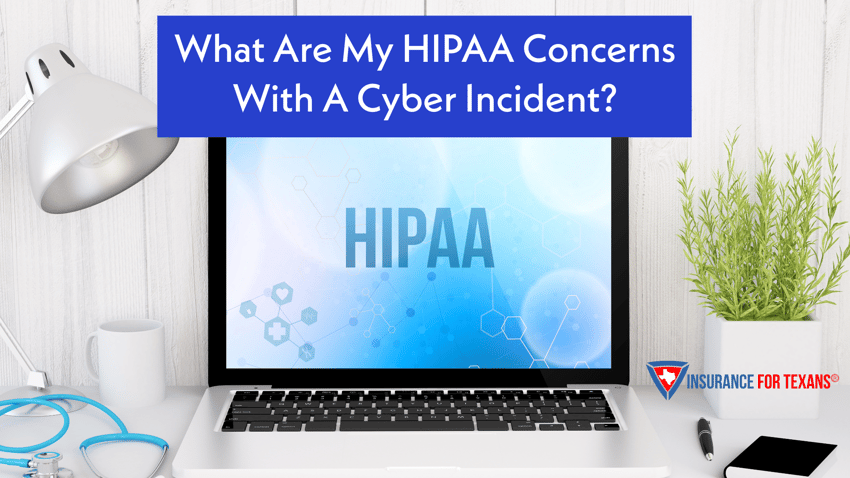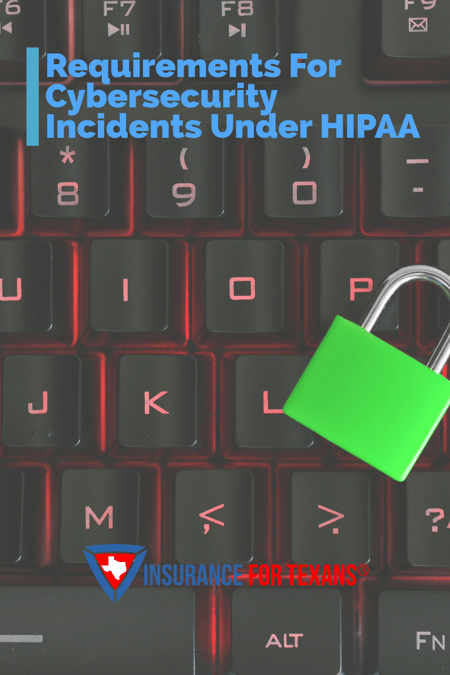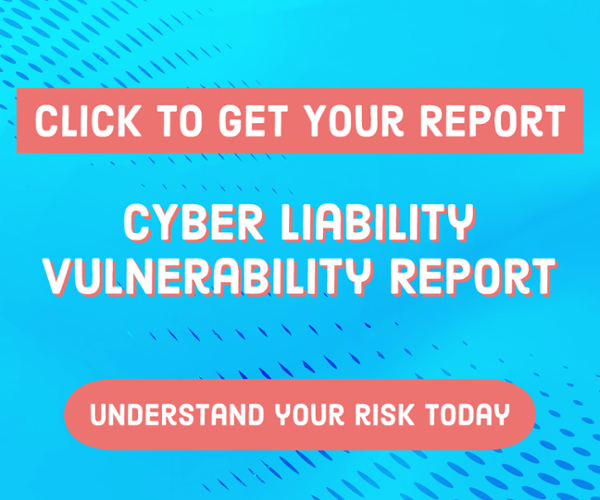If you own or run a dentist practice, medical office, chiropractic office, or other business that collects or handles healthcare data in conjunction with their clients, you've likely had to go through HIPAA training. Or at least hopefully you have! The agents at Insurance For Texans have had many conversations with the decision makers in these businesses around their insurance needs. Some type of insurance may be obvious to you, like malpractice coverage. And some types of insurance may be required, like general liability. But one line item that we always recommend that many of these business owners push back against is Cyber Liability Insurance. If you are part of a big health care network, it may be provided as part of your overall system installation. But if you are a solo-doc, direct primary care doc, or part of a small family practice, you may be willfully operating without protection if there is a healthcare data breach. What does that mean for you and your business? Let's take a look.
What Is HIPAA
The Health Insurance Portability and Accountability Act (HIPAA) is a federal law enacted in 1996 to protect the privacy and security of individuals' medical information. HIPAA applies to all healthcare providers, including doctor and dentist offices, in Texas and across the United States. Under HIPAA, health care organizations and their business associates are required to follow strict guidelines to ensure the confidentiality, integrity, and availability of patients' protected health information (PHI). This includes electronic health records, medical records, and any other personal health information that could identify an individual. HIPAA breaches can occur due to various factors, including unauthorized access, cyber threats, malicious insiders, or technical vulnerabilities. The potential cybersecurity risks associated with a HIPAA breach not only compromise patient privacy but can also lead to significant financial and reputational damage for healthcare organizations. But you likely already knew that if you have sought any amount of legal advice along the way.
Who Does HIPAA Apply to?
When it comes to safeguarding sensitive patient information, HIPAA regulations play a vital role. In the state of Texas, HIPAA applies to a range of entities in the healthcare industry, including doctor offices, dentist offices, and chiropractor offices. These covered entities are responsible for complying with HIPAA regulations to protect personal health information (PHI) and electronic health records (EHRs) from unauthorized access.
HIPAA also extends its reach to health care professionals and health care organizations that handle PHI on behalf of covered entities. These entities, known as business associates, could include third-party vendors providing services like billing, IT support, or cloud storage for doctor and dentist offices.
As cyber threats continue to evolve, health care organizations are increasingly vulnerable to cybersecurity incidents which result in a healthcare data breach. That’s why having a comprehensive cybersecurity strategy, including cyber insurance, is essential for doctor and dentist offices in Texas. Cyber insurance acts as an additional layer of protection, providing financial support in the event of a cybersecurity incident and helping health care networks and offices navigate the complex legal and regulatory requirements that follow.

What Is A Cyber Incident
A cyber incident refers to any unauthorized access or breach of security in a computer system or network that exposes sensitive information to potential threats. In the context of HIPAA regulations, a cyber incident can have serious implications for the security and privacy of electronic health records (EHRs) and patient data. When a cyber incident occurs, it can compromise the confidentiality, integrity, and availability of EHRs. This means that unauthorized individuals may gain access to personal health information (PHI), such as medical records, social security numbers, and dates of birth.
The implications of a cyber incident in the healthcare industry are significant. Health care organizations and professionals, including small doctor and dentist offices in Texas, are required by HIPAA regulations to protect the privacy and security of patient data. A cyber incident can result in significant financial loss due to legal fees, penalties, reputational damage, and potential lawsuits. It can also lead to disruptions in patient care and compromised patient outcomes.
To mitigate the risks associated with cyber incidents, it is crucial for doctor and dentist offices in Texas to implement proper cybersecurity measures, such as robust firewalls, encryption protocols, multi-factor authentication, and regular software updates. Additionally, having cyber insurance is an important layer of protection for these offices. Cyber insurance can help cover the costs associated with responding to and recovering from a cyber incident, including forensic investigations, legal expenses, notification and credit monitoring services, and potential fines or settlements. A great cyber insurance policy will also help cover the costs of your business being interrupted while the forensics and responses are happening. This is why we have these conversations before you have to think about a breach report being filled out!
Cybersecurity Incidents and HIPAA Regulations
Cybersecurity incidents have become a significant concern in the healthcare industry, and especially for more than just credit card number theft. Since these incidents can result in unauthorized access to sensitive patient data, including medical records, social security numbers, and dates of birth, potentially leading to identity theft and fraudulent activities, it's important to understand how the regulations apply to all HIPAA-Covered entities in the event of a healthcare data breach. To mitigate the potentially devastating consequences of these cyber incidents, it is important for healthcare professionals to learn the effects before the event happens.
Overview of HIPAA Regulations
Here is a quick rundown on the key components of HIPAA-Covered Entities and the various parts of the law affect industry stakeholders with respect to a cybersecurity vulnerability.
Covered entities, such as doctor and dentist offices in Texas and their business associates, must comply with HIPAA regulations. The regulations outline three key components to safeguard: administrative, physical, and technical safeguards.
Administrative safeguards involve the implementation of policies and procedures to manage the selection, development, and management of security measures. This includes conducting risk assessments, training employees on HIPAA requirements, and regularly reviewing and updating security measures.
Physical safeguards refer to the measures taken to protect the physical access to patient records. This includes securing facilities, workstation security policies, and establishing policies for the disposal of physical records.
Technical safeguards include the protection of electronic health records (EHR) and the secure transmission of patient data. This includes implementing access controls, encryption, and regularly monitoring systems for unauthorized access.
Non-compliance with HIPAA regulations can have severe consequences. Covered entities found to be in violation may face significant penalties, ranging from monetary fines to criminal charges for willful neglect. Additionally, in the event that a cybersecurity vulnerability is actually exploited, there can be damage to reputation, loss of patient trust, and potential legal actions from affected individuals.
At this point, it's weird to think about a medical office relying on paper records if we're being truthful. That means that the reliance on electronic systems and digital communication has grown. The result is that it is crucial for covered entities to prioritize and implement robust cybersecurity measures.
Covered Entities and Business Associates Under HIPAA
Under HIPAA, there is an important distinction between covered entities and business associates. Covered entities include entities that provide treatment, payment, or operations in the healthcare industry, such as doctor and dentist offices in Texas. These entities are directly responsible for complying with HIPAA regulations and safeguarding the privacy and security of patient records.
On the other hand, business associates are entities that have access to patient information and support treatment, payment, or operations on behalf of covered entities. This includes entities such as subcontractors, consultants, and service providers who handle patient data as part of their services. These business associates are also required to comply with HIPAA regulations to ensure the protection of patient information.
Examples of subcontractors and other related business associates that must also comply with HIPAA include IT companies that manage electronic health records (EHR) systems, billing and coding companies, cloud storage providers, and transcription services. These entities handle patient information on behalf of covered entities and are required to implement appropriate administrative, physical, and technical safeguards to protect the privacy and security of patient records.
Covered entities and their business associates must establish and maintain strong partnerships to ensure full compliance with HIPAA regulations and protect patient records from unauthorized access or disclosure. This includes clearly defining responsibilities and expectations in written agreements and regularly reviewing and updating security measures to address any potential cybersecurity risks.

Requirements for Cybersecurity Incidents under HIPAA
Under the Health Insurance Portability and Accountability Act (HIPAA), covered entities in the healthcare sector, such as doctor and dentist offices in Texas, are required to adhere to specific requirements for cybersecurity incidents. These requirements aim to protect the confidentiality, integrity, and availability of electronically protected health information (ePHI). HIPAA mandates that covered entities must implement administrative, physical, and technical safeguards to safeguard ePHI.
Administrative safeguards involve the implementation of policies, procedures, and training programs to ensure HIPAA compliance within the organization. This includes conducting risk assessments, developing contingency plans, and providing ongoing workforce training on cybersecurity awareness.
Physical safeguards include measures to control physical access to facilities and devices that store ePHI. This can involve securing servers, computers, and other hardware, as well as using access control mechanisms such as badge systems and surveillance cameras. Multi-factor authentication would also fall in this category.
Technical safeguards refer to the technology and processes used to protect ePHI. These include access controls, encryption, and audit controls to monitor and track access to ePHI systems. Regularly updating and patching software and systems is crucial to address vulnerabilities and protect against cyber threats.
Additionally, covered entities must have contingency plans in place to manage and respond to cybersecurity incidents. This includes regularly backing up data, having disaster recovery plans, and establishing incident response procedures to minimize the impact of any potential breach.
Potential Consequences of a Cyber Incident for Covered Entities
Covered entities, such as doctor and dentist offices in Texas, face severe consequences if they fail to adequately protect patient records and personal health information from unauthorized access and cyber incidents. Not only can a breach compromise patient privacy, but it can also result in significant financial losses, reputational damage, and legal liabilities. By understanding and addressing potential consequences, doctor and dentist offices in Texas can take proactive steps to safeguard patient data and preserve their reputation in an increasingly interconnected world.
Financial Penalties and Fines Imposed by HHS OCR
The HHS Office for Civil Rights (OCR) takes HIPAA violations seriously and has the authority to impose significant financial penalties and fines on covered entities that fail to comply with the regulations. These penalties serve as a deterrent and encourage healthcare organizations to prioritize the protection of patient data within the healthcare industry.
Examples of settlements and fines imposed by the OCR have highlighted the severity of the consequences for non-compliance. In recent years, numerous healthcare organizations have faced substantial penalties. For instance, in 2019, a Texas-based medical provider was fined $85,000 for a data breach that exposed the electronic protected health information (ePHI) of over 6,000 patients. The OCR found that the provider had insufficient risk analysis and risk management processes in place.
The settlements and fines demonstrate the seriousness of HIPAA violations and the financial implications for covered entities. It is important for healthcare organizations, especially doctor and dentist offices in Texas, to prioritize compliance with HIPAA regulations. Additionally, implementing cybersecurity measures and obtaining cyber insurance can be crucial in mitigating the potential financial risks associated with cyber incidents and the resulting OCR penalties.
Loss of Reputation and Damage to Image
Something that may be overlooked at first, are the downstream negative effects on your practice's reputation from a cyber incident. The healthcare industry places great importance on patient trust, and any breach of data or unauthorized access to medical records can significantly undermine this trust.
When patients discover that their personal health information has been compromised, it erodes their confidence in the organization's ability to protect their sensitive data. They may question whether their private information is safe in the hands of the healthcare provider, leading to a loss of trust and potential loss of patients. The question then becomes do they move on to a new practice?
In addition to the loss of patient trust, a cyber incident can also tarnish the organization's standing within the community. News of a data breach or unauthorized access spreads quickly, and the negative publicity can have long-lasting effects. The organization may be viewed as negligent or incompetent in their handling of cybersecurity, damaging their reputation as a trusted healthcare provider.
Several healthcare organizations have experienced reputational damage due to cybersecurity incidents. For example, a well-known hospital faced significant public backlash and a decline in patient visits after a data breach exposed the personal health information of thousands of patients. Similarly, a dental clinic saw a severe decline in new patient inquiries and negative online reviews following a ransomware attack that resulted in a breach of patient records.
Legal Action from Patients or Third Parties Affected by Breach
When a cyber incident occurs in a healthcare organization, it not only disrupts the normal operations but also puts the organization at risk of potential legal action. Patients or third parties affected by a breach may take legal action against the healthcare organization to seek redress for the harm caused.
There are several potential legal actions that patients or third parties can take against healthcare organizations. These actions may include claims of negligence, willful neglect, breach of contract, or violation of state privacy laws. Patients may argue that the healthcare organization failed to implement adequate technical controls to protect their personal health information, leading to the breach. They may also claim that the organization did not fulfill its obligations under the contract or violated state privacy laws by not adequately safeguarding their sensitive data.
The potential damages that may be sought in these legal actions can vary. Patients or third parties affected by the breach may seek monetary compensation for financial losses incurred as a result of the incident, such as identity theft or fraudulent charges. Additionally, they may pursue reimbursement for medical expenses related to any treatment required due to the breach.
Steps to Take After a Cyber Incident Occurs
The next logical question in this discussion is what do we do when this occurs? It's not a matter of if. It is a matter of when. In the event of a cyber incident, such as an unauthorized access or data breach, it is crucial for these HIPAA-Covered Entities to take immediate steps to mitigate the damage and address the potential legal and financial consequences.
There are several essential steps that these offices should take to navigate the aftermath of a cyber incident effectively. By following a well-defined incident response plan and implementing appropriate technical controls and risk management strategies, healthcare professionals can safeguard their patients' data, mitigate the impact on patient care, and protect their organizations against legal actions and reputational damage.
Immediate Actions to Take Following the Breach Report
When a cyber incident occurs within a doctor or dentist office in Texas, these are actions that should be taken.
1. Notifying affected individuals: The office must promptly notify all individuals whose personal health information (PHI) has been compromised. This notification should provide details about the breach, the types of information exposed, and the steps individuals can take to protect themselves from potential harm.
2. Conducting a thorough investigation: A comprehensive investigation must be conducted to determine the extent and cause of the breach. This involves examining the affected systems, identifying the vulnerabilities that were exploited, and assessing the potential risks posed to patient records.
3. Implementing measures to mitigate further damage: Once the extent and cause of the breach are understood, immediate steps should be taken to mitigate further damage. This may include patching vulnerabilities, removing any unauthorized access, and strengthening cybersecurity defenses to prevent future incidents.
4. Documenting all actions taken: It is vital to thoroughly document all actions taken in response to the breach. This documentation serves as evidence of the office's response, which can be crucial in demonstrating compliance with legal requirements, such as those outlined by HIPAA.
By following these immediate actions, doctor and dentist offices in Texas can demonstrate a commitment to protecting patient information and mitigating the potential harm caused by cyber incidents. At that point, the regulations will determine what your next steps will be depending upon notification requirements, potential credit monitoring, fines, and other requirements.
How Does Cyber Liability Insurance Help HIPAA-Covered Entities?
Whether your breach was from a malicious insider or an unknown cybersecurity vulnerability beyond your control, the reality for your business is that a robust cyber liability policy can help you not only pay for the expenses associated with a cybersecurity event, but they can provide legal help and the money to keep your business afloat if you're shut down for a period of time. Here are four key ways that a cyber insurance policy can save your business.
1. Business Interruption
If you experience a breach large enough to cause downtime during cybersecurity incidents, you are losing income by not being open for business. Your employees still need to be paid. Rent still needs to be paid. You still need to be paid. How are you going to cover those bills? Business Interruption coverage bridges that gap!
2. Forensics & Repair
One form of cybersecurity controls is shutting down your system and determining the source of the breach, the extent of the breach, and the repair of the breach. These cybersecurity professionals are not inexpensive to hire. A great policy is going to provide coverage for this service.
3. Reporting & Legal
As stated above, you will have various legal and reporting issues to overcome with a breach. This will likely require not only money, but representation from an expert in cyber law. Your policy will help with both sides of this equation if you have secured a robust insurance policy.
4. Monitoring & Reputation
Finally, the thought of providing credit monitoring for your patients may not seem like a lot, but the cost can add up. With that, you will also need a public relations campaign to help regain, rebuild, or keep trust that has been harmed. Do you want to do this yourself, or have the help of professionals that experience in helping cybersecurity victims?
The independent insurance agents at Insurance For Texans are here to help you. We start with a complimentary risk assessment of your business. This is to help you understand where you are today and how we can help you protect your future. If you would like that kind of relationship with your insurance agent, click the picture below to begin a conversation with one of our experts.




